ALBANIA
Tirana

Tirana
Tirana
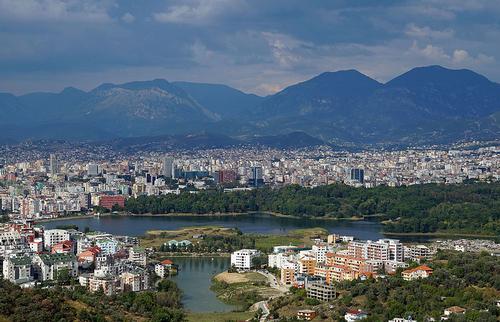
TiranaPhoto: Albinfo CC3.0 Unported no changes made
Tirana is the capital of Albania and is the country's economic and political center. The city is home to special sights and has a turbulent history.
Location
Albania is a Balkan country in southwestern Europe. Tirana is located in the flattest part of Albania on two rivers: the Lanë and the Tiranë. The city is more than a hundred meters above sea level. The nearest port is Durrë , 40 kilometers away. Tirana is a relatively small city compared to other European capitals. Tirana covers an area of 41.8 km² and has about 620 thousand inhabitants.
Weather
Tirana has a pleasant Mediterranean climate characterized by mild winters and warm summers. In the winters it sometimes freezes, but the mercury almost never drops below -10 degrees. In summer it can be quite hot with peaks of up to 40 degrees. In the summer there is hardly any rainfall, but in the winter months it can be quite wet. There is almost never snow.
History
Tirana was founded in 1614 by the Ottoman nobleman Sulejman Pasha. He immediately built a mosque, marketplace and a Turkish bathhouse in the city. On November 26, 1912, the Albanian flag was hoisted in Tirana, ending Ottoman rule.
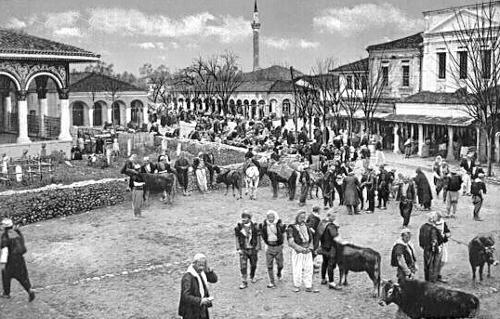
Tirana bazar 1900Photo: Public domain
As early as 1913, during the First Balkan War, Tirana was once again occupied by the Serbian army. The Habsburgs and the Bulgarians also ruled in history in (parts of) Albania. After the end of the First World War, Albania became first a republic and then a kingdom under King Zog I (1928-1939).
Until the twentieth century, Tirana remained relatively small and insignificant. This changed in 1920 when it was decided to make Tirana the capital of the country. Before that, Lushnjë was capital of the country.
On April 7, 1939, the Italians, led by Mussolini, took Tirana. They built various residential buildings with a classic look. In 1941, Enver Hoxha founded the Communist Party of Albania. Tirana became the country's communist center. On November 17, 1944, the communists, together with the inhabitants of the city, revolted against German rule. Ultimately, this resulted in the liberation of the city.
After World War II, the communists ruled the impoverished Albania for over 40 years led by the oppressor Enver Hoxha. Hoxha was succeeded by Ramiz Alia after his death. The pressure on communism increased and the first elections were finally held in 1991. Initially, a communist party was elected, but when the government fell, the Democratic party emerged victorious.
Places of interest
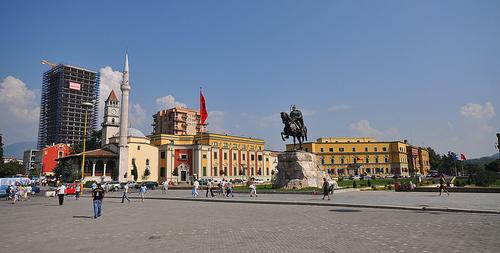
Skanderbeg Square TiranaPhoto: Predrag Bubalo CC 2.0 Unported no changes made
Skanderbeg Square is the center of Tirana. Built entirely in Soviet style, the square is named after the Albanian national hero Skanderbeg (born Gjergj Kastrioti) who fought the Ottoman Empire. A statue of the hero on horseback can be found in the square under the Albanian flag. The imposing square is also surrounded by the National History Museum, the opera, the National Bank and the Et’ hem Bei Mosque.
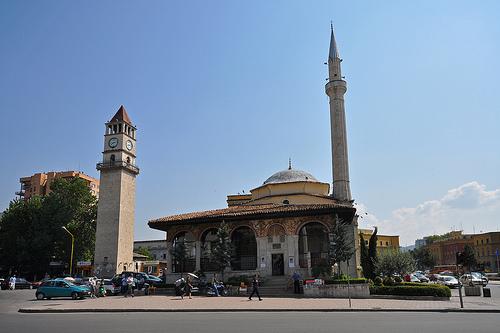
Et'hem Bei Mosque TiranaPhoto: Predrag Bubalo CC 2.0 Unported no changes made
Et’ hem Bei Mosque is one of Tirana's oldest buildings. The building of the prayer house was started by the son of the founder of Tirana in 1789. It was not until 1821 that the construction was completed by his grandson. The mosque has 15 columns and 14 arches. There are beautiful still lifes in fresco and the angular minaret is also very special.
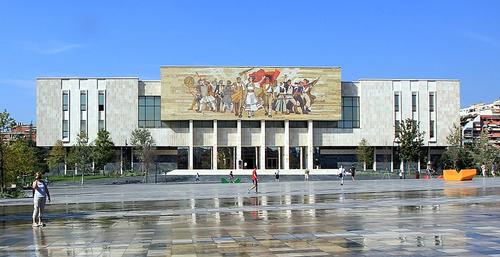
National Historic Museum TiranaPhoto: Karelj CC 4.0 International no changes made
The most important museum in Tirana is the National History Museum, which gives an impression of Albanian life in earlier times. In the museum, each room has its own theme about the contribution to the existence of Albania. In Tirana you will find many museums. The Archaeological Museum has many ancient objects from the Stone Age, Bronze Age and the Greek era. By means of objects and images you get a good impression of the history of Albania.
Tips
It is highly recommended to take a stroll through Tirana's main street Rruga Bajram Curri. Here are trees and houses from the Ottoman era. And you imagine yourself in a bygone era.
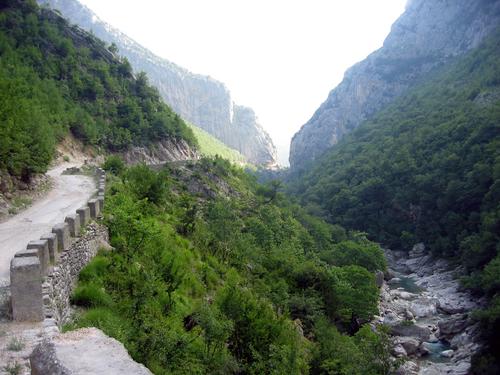 Tirana Dajti ParkPhoto: Albinfo CC 2.5 Unported no changes
Tirana Dajti ParkPhoto: Albinfo CC 2.5 Unported no changes
Another tip? The Dajti National Nature Park is located near Tirana. This coastal park is full of colorful wild flowers and beautiful pine trees.
Useful links Tirana
BBC Country ProfilesWorld Fact Book Explore all Countries
How to call
Last updated January 2026
Copyright: Team - The World of Info